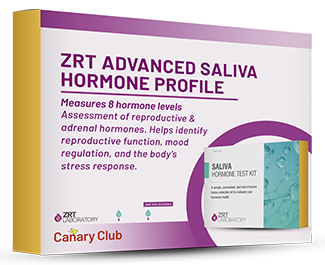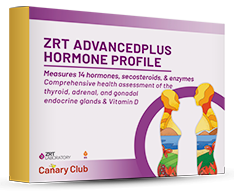Applying the Goldilocks Principle to Stress
Stress is nature's gift. Every species needs just the right amount of it for healthy growth.
Seedlings defy the stress of gravity, pushing out of the dirt to rapidly grow towards the sky. Chicks break out of their egg shells, thrusting into a new world of breath and sunlight.
At any moment, too much stress would sap their early life. Strangely, too little stress often means they don't develop well enough to survive.
Just the right amount of stress is needed for every living thing to remain in healthy balance with the natural world. When stress levels are "just right" we call this the Goldilocks Principle of Stress.
Getting a better understanding of how stress effects our health is the first step to boost our wellness.
How Do Our Bodies Regulate Our Hormones to Respond to Stress?
We live in a society telling us that stress is bad for us. This perspective is not entirely true. Maintaining homeostasis, which is keeping internal equilibrium and balance, our bodies produce a form of stress to change our internal state using hormones. Keeping us within healthy limits, homeostasis effortlessly maintains a steady state of internal, physical, and chemical reactions. Homeostasis is the Goldilocks principle, governing every metabolic function in our bodies.
Our bodies maintain homeostasis by responding to a variety of external stressors—creating a cascade of metabolic responses. Many of these directly alter the levels of hormones. For example, our bodies induce a form of stress to wake us up in the morning. By spiking the hormone levels of cortisol, we wake up and have the energy to get out of bed. When there is too little "stress" hormone cortisol, we continue to sleep. When we do eventually wake up, we feel groggy and fatigued. We've described these symptoms of how too much or too little of the hormones cortisol, and its counterpart melatonin, in a past article: Your Sleep Disturbances May Be Hormone Related.
We suggest the first step to responding better to stress is to consider one's attitude about it. Our health will improve when we adopt an understanding that stress is nature's way of promoting growth and change within us with just the right amount.
When we believe stress is happening to us, we tend to stay stuck in a stress response. Stress then results in the feeling of being overwhelmed, with either mental or emotional pressure. At this point, we often escalate the stress response by compulsively thinking about the stressor. Believing we have no options or no solutions, we spiral downward.
When our perspective is that stress is happening for us, we discover stress isn't the problem; instead, our response to it is the problem. We learn ways of letting it go.
How Do Different Stressors Affect Different Hormones?
Hormones play a vital role in our emotions, as do the quality of our diet, sleep, and exercise. Behind every worthwhile ambition, desire, and pursuit there is a hormone driving our passions. Hormones powerfully influence the thrills we experience in life as well as our downward emotional response to life's disappointments.
What are the Symptoms of Prolonged Stress?
When we are healthy, homeostasis is a quick response to stressors. Unfortunately, when the body is exposed to long-term chronic stress, often from our inability to practice letting it go, the conditions it creates can be cardiovascular disease, cognitive impairment, diabetes, gastrointestinal problems, obesity, skin rashes, asthma, arthritis, and depression.
The following changes may be signs that an individual is overly stressed:
- Changes in appetite or weight
- Changes in sleep patterns
- Loss of interest in activities previously enjoyed
- Restlessness
- Sadness, guilt, or feelings of irritability
- Thinking negatively
How Does Stress Affect the Body?
Chronically high levels of stress may suppress immunity, leaving you vulnerable to more serious conditions listed below.
Immune Health
Stress can increase levels of cortisol. High cortisol levels may reduce natural killer cell activity, immune cells that limit the spread of certain viruses and tumors.
Heath Health
Chronically high cortisol levels may increase blood pressure, blood sugar, cholesterol, and triglycerides—all factors that can increase your risk of hypertension, stroke, and heart attack.
Gastrointestinal Health
Stress may cause GI symptoms such as heartburn, indigestion, nausea and vomiting, diarrhea, constipation, or belly pain.
Epilepsy
Stress may trigger a seizure in individuals with eipilepsy.
Diabetes
If you have diabetes, stress can inhibit insulin production, potentially contributing to more diabetic complications.
Inflammation
Stress may lead to a manifestation of atopic dermatitis (an inflammatory skin condition), asthma, or allergies.
How to Better Manage Stress?
Coping with stress will look different depending on the individual. However, the following strategies may be helpful for reducing stress levels:
- Identify what is causing you stress.
- Consider a mindfulness practice of letting it go.
- Talk to others about how you’re feeling (e.g., friends, family, coworkers, a therapist).
- Consider taking a course or class on stress management.
- Consider participating in physical and mental exercise such as walking, running, or meditation.
- Work on improving your nutrition with the assistance of a qualified healthcare practitioner.
- Participate in a hobby that you enjoy.
- Don’t be too hard on yourself and take things one day at a time.
Stress is a natural and helpful bodily reaction, yet, chronic stress may negatively affect health and lead to or exacerbate more serious health conditions related to a suppressed immune system and chronic inflammation.
Stress management techniques and coping mechanisms such as therapy, exercise, meditation, a healthy diet, and participating in hobbies can help reduce stress levels. Speak with your integrative healthcare practitioner if you’re feeling stressed and to receive advice on how to reduce stress levels.
What is the ZRT Advanced Saliva Hormone Profile?
 How can you know you have an actual hormonal imbalance, other than feeling a bit off your rocker? Our at-home Advanced Saliva Hormone Profile checks your sex and adrenal hormone levels: active levels of estrogen (estradiol), progesterone, testosterone, DHEA-S, and 4 cortisol tests to determine a FULL DAY assessment of your overall stress management. Hormonal symptoms often overlap with one another so a full evaluation of a patient’s overall hormonal profile is critical in diagnosing the core issues.
How can you know you have an actual hormonal imbalance, other than feeling a bit off your rocker? Our at-home Advanced Saliva Hormone Profile checks your sex and adrenal hormone levels: active levels of estrogen (estradiol), progesterone, testosterone, DHEA-S, and 4 cortisol tests to determine a FULL DAY assessment of your overall stress management. Hormonal symptoms often overlap with one another so a full evaluation of a patient’s overall hormonal profile is critical in diagnosing the core issues.
Test samples are taken from saliva only—no blood spot to worry about. Once you mail in your samples, in just a few days your results are delivered via email in an easy-to-read assessment- not just the numbers but also clearly written evaluations and explanations.
Vitamins and supplements can also be helpful in managing stress responses and reducing anxiety. Studies show that the vitamin B complex enhances mood and energy. Natural herbs including St. John's Wort, skullcap, and lemon balm are called "nervines" and as the term implies, are soothing for the nervous system as well as relaxing muscle tension and calming the mind.
Of course, before you begin taking anything new you should consult with your doctor. Some supplements can interact with pharmaceuticals, so it is always better to be on the safe side.
To break it down, the healing process can look like this: awareness, knowledge, and remedies. By now you are aware, evidenced by your interest in this article and reading it to the very end! Knowledge through hormone testing. And remedies via lifestyle choices and working with a hormone health professional and other counselors for continued support.
RECOMMENDED TESTS
Advanced Saliva Hormone Profile: Focuses on steroid and adrenal hormones. Estradiol (estrogen), progesterone, testosterone, DHEA-S, and 4x diurnal cortisol.
Canary Club has a wide variety of at-home hormone and neurotransmitter tests from which to choose. These can indicate imbalances that cause or exacerbate chronic anxiety. This information is a great first step on the path to long-term well-being. Here is a short list of recommended tests: Canary Club is the place where you can come to better understand your condition, whether it is mild, moderate, or severe. Our goal is to help you find the information you need in order to effectively manage stress and live a more vibrant and vital life.
ZRT Advanced Saliva Profile
 See our ZRT Advanced Saliva Profile to check your adrenal and reproductive hormone levels.
See our ZRT Advanced Saliva Profile to check your adrenal and reproductive hormone levels.
Advanced Saliva Test Kit Includes:
- Estradiol (E2), Progesterone (Pg), and Testosterone (T) - known as the three major sex steroid hormones,
- Adrenal Hormones:
- DHEA-S (DS), and,
- Diurnal Cortisol (sampled 4x), showing your full daily cortisol cycle.
Canary Club Advanced Saliva Hormone Profile is also known as ZRT Saliva Profile III.
Available Add-ons:
You will be able to include these add-ons during the ordering process for the Advanced Saliva Profile.
Available add-ons: E1 Estrone and E3 Estriol
Additional Stress-Related Tests
- Cortisol Awakening Response
- Adrenal Stress Test
- Diurnal Cortisol 4x
- Women's Sex & Stress Hormone Panel
Additional Resources:
ZRT AdvancedPlus Profile
This innovative combination, recommended by Dr. Richard Shames, MD, Dr. Richard Shames, MD, is a specialist in endocrinology hormones. Practices as a Consulting Physician and Personal Health Coach, focusing on thyroid and adrenal disorders and their many related conditions, offers a more cost-effective assessment of the major hormones produced by the thyroid, adrenal, and gonad glands, along with an evaluation of Vitamin D levels. This consolidated approach streamlines the testing process offering greater value
- Sex steroid hormones (in saliva): Estradiol (E2), Progesterone (Pg), and Testosterone (T)
- Adrenal Hormones (in saliva): DHEA-S (DS), Diurnal Cortisol (sampled 4x to show your full daily cortisol cycle)
- Thyroid hormones (in blood spot): TSH, fT3, fT4, TPOab
- Vitamin D (in blood spot): 25-OH, Total (D2, D3)



